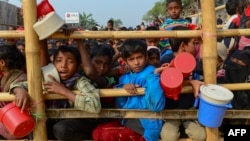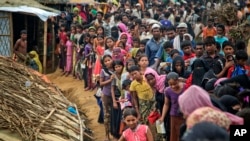The gradual repatriation of Rohingya Muslim refugees to Myanmar from Bangladesh, previously set to begin Tuesday, has been delayed.
It was not immediately clear when the process will begin.
Myanmar and neighboring Bangladesh recently completed an agreement to repatriate hundreds of thousands of Rohingya Muslims who fled Myanmar to escape a brutal military crackdown.
Aid workers and the Rohingyas are concerned that refugees will be forced to return to a place that they fled just a few months ago.
Human rights group Amnesty International, which had previously condemned the deal, called the Bangladeshi government's decision to postpone the return of Rohingya refugees "a welcome relief for hundreds of thousands currently living in Bangladesh."
"Implementing a returns arrangement finalized last week in its current form would put the safety and rights of more than 650,000 Rohingya who fled a brutal military crackdown last year in serious jeopardy," Amnesty said in a statement.
Many of the refugees have balked at the prospect of returning to Myanmar.
Entire Rohingya communities in Myanmar have been burned to the ground. In addition, Rohingya refugees have told human rights workers of a host of atrocities committed by Myanmar security forces, including random shootings, rapes and the total destruction of their homes and villages.
In Myanmar's Rakhine state, where most Rohingya lived before fleeing, a Buddhist leader said he was not looking forward to the return of the Rohingyas. Than Tun said, "International pressure, because of human rights and humanitarianism, means we have to accept them back, even though we don't want to."
Myanmar's military has been accused of launching a scorched earth campaign in August against Rohingya villages in response to attacks on Myanmar police outposts by Rohingya militants.
The United Nations has described the reported actions carried out by Myanmar forces as "a textbook case of ethnic cleansing."
The Rohingya minority has been denied citizenship and other rights in Buddhist-majority Myanmar, which views Rohingya as immigrants from Bangladesh, despite the fact that many families have lived in Myanmar for generations.















